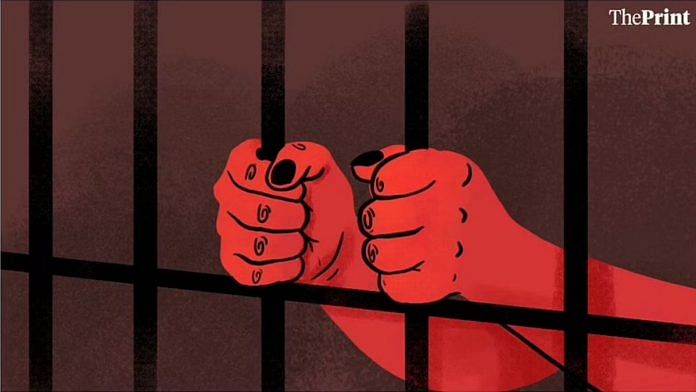New Delhi: Spurred by a directive from the Union ministry of home affairs (MHA), Dravida Munnetra Kazhagam’s Villupuram MP D. Ravikumar has written to Tamil Nadu Law Minister S. Regupathy to take immediate steps to end caste-based discrimination in prisons across the state.
“The prison manuals of Tamil Nadu are over 40 years old. I went through the prison manuals and was shocked to learn they were updated in 1983. It is the basic prison manual that the British created,” MP Ravikumar told The Print.
In a letter dated 6 March, Ravikumar drew Regupathy’s attention to rule number 447 of the Tamil Nadu Prison Manual. The rule restricts the involvement of convicts in extramural employment (beyond the jail precincts) if they belong to “a member of a wandering or criminal tribe”, a violation of the right to equality in Article 14 of the Constitution.
“Caste-based discrimination in the prisons violates Article 14 of our Constitution and should be immediately ended. The Tamil Nadu prison is restricting the wandering tribes from extramural employment,” he told The Print.
The letter also referenced rule number 472 of the manual, which empowers jail authorities to involve convicts in manual scavenging in contradiction to a ban on the practice.
“I have also learned of the practice of authorities asking for the caste of a prisoner upon entry in jail,” Ravikumar said in his letter.
In its directive to the chief secretaries of all states and Union territories (UTs), MHA has said to end caste and religion-based discrimination in prisons. It has also urged states and UTs to remove all discriminatory provisions from their jail manual.
“Jail manuals of some states provide for segregation of prisoners based on their caste and religion, and they (the prisoners) are assigned prison duties, accordingly,” said the MHA in its February 26 directive.
The MHA directive followed a notice issued by the Supreme Court on 3 January, 2024, to the Union government and 13 state governments, including Tamil Nadu. This notice addressing the issue of caste-based segregation in prisons across India came in response to a public interest litigation (PIL) filed by Mumbai-based journalist Sukanya Shantha in 2020.
Also read: 3 new criminal laws to come into effect from 1 July, section on 10-yr jail for hit & run put on hold
How jails enforce caste
In many jails across India, convicts are assigned tasks based on their caste. Convicts from a dominant caste are assigned cooking duties, and lower-caste convicts are assigned chores like sweeping and cleaning.
“The barber should belong to the A class, and sweepers should be chosen from the Mether, Hari caste or Chandal caste” — these rules in the West Bengal jail code were among the few instances highlighted in the PIL filed by Shantha.
According to Shantha, who has been studying caste-based discrimination in prisons as a journalist and a researcher for a decade, filing a petition is not easy.
“I had to do a lot of leg work to corroborate the points I had been mentioning in the petition. I, to be honest, felt that I got lucky with senior advocate S. Muralidhar representing my case pro bono. Otherwise, going to the SC for a journalist would have been extremely expensive,” said Shantha.
Shantha, who describes her work as rooted in anti-caste and Ambedkarite politics, said the battle against such discrimination is far from over, and added that she would not relent until caste discrimination is eradicated from prisons — not only on paper but also in practice.
During the hearing of the case in January before an SC division bench comprising Chief Justice of India (CJI) D.Y. Chandrachud and Justices J.B. Pardiwala and Manoj Misra, S. Muralidhar pointed out that “these communities have long faced discrimination in the society and their ill-treatment continues even when they go to prison”.
The petition also cited National Crime Records Bureau (NCRB) data to highlight the over-representation of Scheduled Castes, Scheduled Tribes, and Other Backward Classes in jails.
“The caste realities of the carceral system in India entail a range of discriminatory practices, including the division of labour determined based on caste hierarchy and caste-based segregation of barracks,” the petition read.
‘What is your caste?’
MP Ravikumar cited Shantha’s report in his letter to highlight the condition of Tamil Nadu’s Palayamkottai Central Jail. Thevars, Nadars, and Pallars are allotted different barracks in the central jail based on their caste, the petition said. The Thevars are sent to the Thevar barrack and the Pallars to the Scheduled Caste barrack.
“This is not only discriminatory but also illegal,” said Kumar.
Kumar said the states should amend the prison manuals before responding to the SC notice.
Another issue Kumar raised was prisoners still being asked what their caste is when they enter jails. “There is no rule about asking the caste of prisoners in jail, but it still happens. After their caste is known, they are treated accordingly,” said Kumar.
(Edited by Madhurita Goswami)
Also read: Over 38% inmates in Indian jails are OBCs, 10% increase in a decade, study finds



